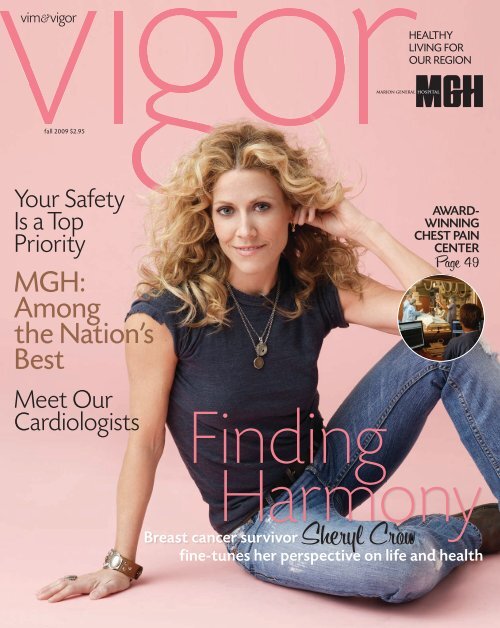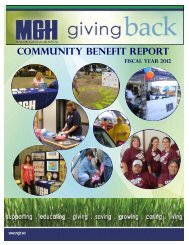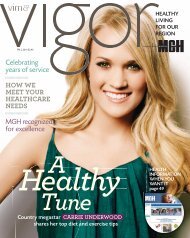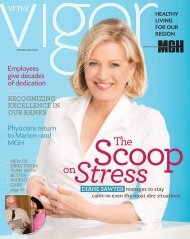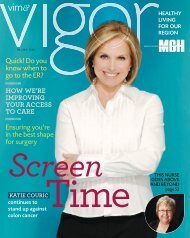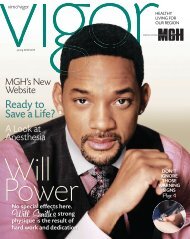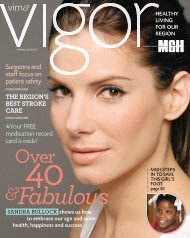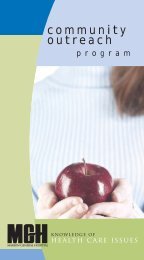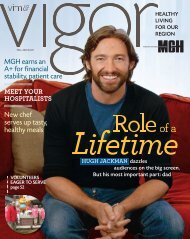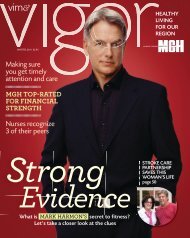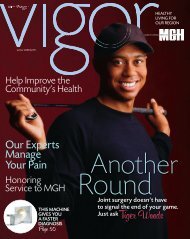MGH: Among the Nation's Best - Marion General Hospital
MGH: Among the Nation's Best - Marion General Hospital
MGH: Among the Nation's Best - Marion General Hospital
Create successful ePaper yourself
Turn your PDF publications into a flip-book with our unique Google optimized e-Paper software.
Life in <strong>General</strong>Risk Manager ReceivesNational Designation<strong>Marion</strong> <strong>General</strong> <strong>Hospital</strong> is proud to announceSusan Smoker, MSN, R.N., CPHRM, has earned <strong>the</strong>designation of certified professional in healthcarerisk management from <strong>the</strong> American <strong>Hospital</strong>Association. The CPHRM is a national credentialthat distinguishes an individual as being among <strong>the</strong>elite in a critical field of healthcare management.Susan Smoker, MSN, To become a CPHRM, Smoker had to satisfyR.N., CPHRMeligibility requirements that incorporate a blendof work experience and education, agree to adhere to professional standardsof conduct and pass <strong>the</strong> CPHRM examination, which tests knowledgein <strong>the</strong> areas of loss prevention/reduction, claims management, riskfinancing, regulatory/accreditation compliance, operations and bioethics.“This certification is <strong>the</strong> result of two years of training and educationin risk management,” Smoker says. “It will allow me to better perform myduties and responsibilities in my role as risk manager.”Smoker earned her bachelor’s degree in nursing from IndianaWesleyan University and a master’s degree in nursing from IndianaUniversity. She has been employed by <strong>MGH</strong> for 29 years.Anes<strong>the</strong>siologistRejoinsMedical Staff<strong>Marion</strong> <strong>General</strong> <strong>Hospital</strong> again welcomesJohn Todorczuk, D.O., to its medical staff.Todorczuk completed his undergraduatestudies at <strong>the</strong> West Virginia UniversitySchool of Pharmacy in Morgantown, W.V.,and earned his medical degree from <strong>the</strong>West Virginia School ofOsteopathic Medicine inLewisburg, W.V.He is certifiedwith <strong>the</strong> AmericanOsteopathic Board ofAnes<strong>the</strong>siology and isaffiliated with <strong>Marion</strong>Anes<strong>the</strong>siologists PC.John Todorczuk, D.O.Emergency Nurses Earn National CertificationThree of <strong>Marion</strong> <strong>General</strong> <strong>Hospital</strong>’s emergency departmentnurses have earned a nationally recognized credential in emergencynursing. Julie Fowler, R.N.; Cindy Canida-Woodward,R.N., M.S.; and Cathy Slusser, R.N., M.S., recently passed <strong>the</strong>certified emergency nurse (CEN) examination administered by<strong>the</strong> Board of Certification for Emergency Nursing.“Achieving certification in a specificarea allows <strong>the</strong> R.N. to demonstrateexpertise in <strong>the</strong>ir field,”says Bernadine Wallace, R.N.,MSN, chief nursing officer. “Theseare dedicated, experienced nurseswho have gone above and beyondto provide <strong>the</strong> safest and best careto <strong>the</strong>ir patients, and I commend<strong>the</strong>m for <strong>the</strong>ir efforts. They are <strong>the</strong>reason we are a Magnet hospital.”The CEN credential representsa commitment of a nurseFrom left: Julie Fowler, R.N.; Cindy Canida-Woodward, R.N.,M.S.; and Cathy Slusser, R.N., M.S.to provide quality emergency care. Emergency nursing isunique because it incorporates a wide spectrum of patientcare that requires highly specialized skills and extensiveknowledge, as well as <strong>the</strong> ability to care for all ages ofpatients who have illnesses or injuries ranging from veryminor to critical.The CEN examination evaluates<strong>the</strong> nurse’s knowledge in <strong>the</strong>areas of clinical pathophysiology,patient care management, professionalissues, environment, toxicology,shock, trauma and medicalemergency care.All three nurses are a part of <strong>the</strong>dedicated and competent team ofhealthcare professionals providingemergency care to Grant and surroundingcounty residents 24 hoursa day, seven days a week.vim & vigor • fall 2009 3
A sleep study may be <strong>the</strong>key to a good night’s restSnoozeCluesBy Randy DeffenbaughHow many times have you made fun ofo<strong>the</strong>rs who snore? How often has yoursnoring been <strong>the</strong> brunt of family jokesor laughter? Unfortunately, snoringis no laughing matter. Snoring can cause you tosuffer from headaches, difficulty concentrating,daytime fatigue and reduced work performancebecause of <strong>the</strong> interrupted sleep it causes.Don’t think you snore? You are not alone; most peopledon’t think <strong>the</strong>y do. The best way to find out is to ask yourbed partner. He or she knows firsthand about your snoring—and <strong>the</strong> quality of his or her sleep also may suffer becauseof your problems.Snoring is an indication that <strong>the</strong> breathing passage in yourthroat is not fully open. It can also be an indication of somethingmore serious called sleep apnea.❋ A Most Serious ProblemSleep apnea is just one of more than 80 sleep disordersAmericans suffer from. What makes this one so significantis, if untreated, it worsens over time and becomes lifethreatening.Long-term consequences include diabetes, highblood pressure, stroke, heart failure, heart attack and death.Sleep apnea is very common, affecting more than 12 millionAmericans, <strong>the</strong> National Institutes of Health says. Theproblem can affect anyone at any age, even children. Riskfactors for sleep apnea include:• Male gender• Overweight• Being older than 40• A large neck size (17 inches or greater in men and 16 inchesor greater in women)• Large tonsils• A family history of sleep apneaSleep apnea occurs when a person’s breathing is interruptedduring sleep. People with untreated sleep apnea stopbreathing repeatedly during sleep, sometimes hundreds oftimes during <strong>the</strong> night and often for a minute or longer.4vim & vigor · fall 2009
There are three types of sleep apnea: obstructive,central and mixed.OBSTRUCTIVE SLEEP APNEA, <strong>the</strong> most common,is caused by a blockage of <strong>the</strong> airway, usuallywhen <strong>the</strong> soft tissue in <strong>the</strong> rear of <strong>the</strong> throatcollapses during sleep.CENTRAL SLEEP APNEA, so called because itrelates to <strong>the</strong> function of <strong>the</strong> central nervoussystem, occurs when <strong>the</strong> airway is not blockedbut <strong>the</strong> brain fails to signal <strong>the</strong> muscles tobrea<strong>the</strong> because of instability in <strong>the</strong> respiratorycontrol center.MIXED OR COMPLEX SLEEP APNEA, as <strong>the</strong>name implies, is a combination of obstructiveand central.❋ The Sleep StudyIf you suspect you may have sleep apnea, discussit with your primary care physician. Your physicianmay suggest you undergo a sleep study orpolysomnogram at a sleep lab. The test monitorsyour brain waves, heartbeat and breathing asyou sleep. It also records your eye and leg movementsas well as muscle tension.• During a sleep study, sensors that send tiny electrical signalsto a computer are placed on your head, face, chest andlegs. Those electric signals become data that are analyzed bya qualified physician to determine whe<strong>the</strong>r you have sleepapnea or any o<strong>the</strong>r sleep disorder. You will not feel any painduring <strong>the</strong> study. The sensors are placed gently on your skinand connected to a computer. The wires are long enough tolet you move around and turn over in bed.<strong>MGH</strong> HasSolutions<strong>Marion</strong> <strong>General</strong> <strong>Hospital</strong> has anew sleep lab, convenientlylocated at 1387 N. Baldwin Ave.,which can help diagnose sleepapnea and o<strong>the</strong>r sleep disorders.Corey Mettler, <strong>MGH</strong> sleeplab manager, knows <strong>the</strong> advantages that continuous positive airwaypressure, or CPAP, offers patients. “Many patients have told me it’s <strong>the</strong>best thing that has ever happened to <strong>the</strong>m,” he says. “They can onceagain function throughout <strong>the</strong> day without taking naps or falling asleepat inappropriate times.”<strong>MGH</strong>’s warm and inviting sleep study rooms have been designed foryour comfort, complete with queen-size beds; flat-screen televisionswith remote; large, puffy pillows; fans; private bathrooms; and hotel-likedecor—all <strong>the</strong> comforts of home when away from home.• A technician will run a short check on <strong>the</strong> quality of <strong>the</strong>signals prior to starting <strong>the</strong> study. The lights are <strong>the</strong>n turnedout and you will be asked to try to fall asleep. An infraredvideo camera allows a technologist to see you and recordyour activity from a nearby room during <strong>the</strong> test, which usuallytakes place overnight. Daytime studies are available forshift workers.• If your initial results show a significant amount of sleepdisordered breathing, you will be asked to return for a secondstudy where continuous positive airwaypressure, or CPAP, will be used. During thisphase, you will wear a nasal mask that deliversincreased air pressure into your airway in anattempt to open <strong>the</strong> airway and alleviate yourproblematic breathing.Can you remember <strong>the</strong> last time you feltfully rested? When your head hits <strong>the</strong> pillowat <strong>MGH</strong>, <strong>the</strong> final objective is for you to sleeplike never before.<strong>MGH</strong>’s sleep study rooms include queen-size beds, flat-screen televisions, largepillows, fans, private bathrooms and hotel-like decor.Need to Sleep?Don’t let your sleep apnea gountreated. Your life may depend on it.Ask your physician to schedule your sleepstudy today by calling 866-363-7535.callvim & vigor · fall 2009 5
Everything you need—close to home, family and friends6ExpertCardiacCareBy Melo-Dee Perez, M.S., R.N.Did you know <strong>Marion</strong> <strong>General</strong> <strong>Hospital</strong> offersexpert interventional cardiac care close to home? The samelevel of care and expertise offered in bigger cities, at largerhospitals, is available in <strong>Marion</strong>. Now you can be close to yourfamily and friends and avoid <strong>the</strong> problems associated withtraveling out of town.Experienced <strong>MGH</strong> cardiologists and interventional cardiologistsfrom Care Group Cardiology in Indianapolis, as wellas registered nurses and registered radiology technicians,perform <strong>the</strong> following procedures in state-of-<strong>the</strong>-art, totallydigital cardiac ca<strong>the</strong>terization/electrophysiology labs.Cardiac Ca<strong>the</strong>terization❋What it is: The insertion of a flexible tube into <strong>the</strong> coronaryarteries. <strong>MGH</strong> and its staff have performed more than 4,000of <strong>the</strong>se procedures.❋What it does: Dye is injected through <strong>the</strong> tube to illuminate<strong>the</strong> arteries under X-ray to show narrowing or blockage.❋ Procedure time: Less than 1 hour.❋ Required stay: 1-4 hours of bed rest.Coronary Angioplasty andStent Placement❋What it is: If a cardiac ca<strong>the</strong>terization shows a narrowingor blockage, <strong>the</strong>se may be able to open <strong>the</strong> artery.Depending on <strong>the</strong> location and size of <strong>the</strong> blockage, one orboth procedures may be done. These procedures often aredone right after <strong>the</strong> cardiac cath.❋What it does: Both use ca<strong>the</strong>ters similar to a cardiac cath.Angioplasty uses a balloon-tipped ca<strong>the</strong>ter to inflate andwiden <strong>the</strong> artery. A stent (a mesh tube that is collapsed over<strong>the</strong> ca<strong>the</strong>ter) is used to hold open an artery that has beenwidened by angioplasty and requires fur<strong>the</strong>r support. Whenvim & vigor • fall 2009<strong>the</strong> balloon is inflated, <strong>the</strong> stent expands, locks in place andforms a scaffold. The stent stays in <strong>the</strong> artery permanentlywhen <strong>the</strong> balloon-tipped ca<strong>the</strong>ter is deflated and removed.❋ Procedure time: Varies.❋ Required stay: Overnight.Electrophysiology Studies❋What it is: Monitors your heart rhythm from inside <strong>the</strong>heart with special equipment. A specially trained cardiologist,or electrophysiologist, performs <strong>the</strong> test.❋What it does: Any changes that are induced or triggeredduring <strong>the</strong> test are studied to determine <strong>the</strong> exact causeand what can be done to control it.❋ Procedure time: 1-2 hours.❋ Required stay: A few hours to overnight.Pacemaker Insertion❋What it is: A small electronic device that is permanentlyplaced inside your body.❋What it does: Monitors your heart rhythm. When <strong>the</strong>device detects a slow heart rate, it sends electrical signalsto speed <strong>the</strong> heartbeat.❋ Procedure time: 1-2 hours.❋ Required stay: Overnight.Implantable Cardioverter Defibrillator❋What it is: ICD for short, it’s like a pacemaker with extrafeatures.❋What it does: If <strong>the</strong> heart’s rhythm becomes too fast ortoo slow, <strong>the</strong> device sends out pacing impulses or brieflyshocks <strong>the</strong> heart to allow it to return to a normal rhythm.❋ Procedure time: 1-2 hours.❋ Required stay: Overnight.Biventricular ICD❋What it is: A treatment option that may decrease heartfailure symptoms when your heart is weakened anddoesn’t pump as well as it should.❋What it does: Helps a weakened heart to maintain a healthyheartbeat and assists <strong>the</strong> heart in pumping more effectively.❋ Procedure time: 2-4 hours.❋ Required stay: Overnight.At <strong>MGH</strong>, we pride ourselves in offering patients invasivecardiac procedures close to home, family and friends.We have <strong>the</strong> quality and expertise needed to provide ourHealthcare Community with <strong>the</strong> highest level of cardiac carethat is only a heartbeat away.
Meet <strong>MGH</strong>’s Cardiac ExpertsGary A. Frick, D.O., R.Ph.,RSO, M.S., FACC, FACOI• 15 years of experience• Board certified, cardiovascularand internal medicine• Fellow, American College ofCardiology and AmericanCollege of OsteopathicInternists• Diplomate, National Board ofExaminers for OsteopathicPhysicians and Surgeons• Cardiovascular medicinefellowship, internal medicineresidency, MidwesternUniversity, ChicagoOsteopathic Medical Center,Chicago• Internship, NormandyOsteopathic <strong>Hospital</strong>s,St. Louis, Mo.• Medical school, cum laude,University of North Texas,Health Science Center atFort Worth, Texas Collegeof Osteopathic Medicine,Fort Worth, Texas• Master of Science degree inhospital pharmacy• Bachelor of Science degreein pharmacy• Published authorJames P. MacKrell, M.D.,FACC• 20 years of experience• Graduate with honors,University of Notre Dame• Internal medicine residencyand cardiology fellowship,University of PittsburghSchool of Medicine• Board certified, internalmedicine and cardiovasculardiseaseSriram S. Nathan, M.D. ,FACC• 10 years of experience• Internal medicine internship,residency and cardiology fellowship,University <strong>Hospital</strong>and Clinics, Columbia, Mo.• Fellow, American College ofCardiology (FACC)• Board certified, internalmedicine• Board certified, cardiology• Board certified, nuclearcardiology• Level II training in cardiac CTCall <strong>the</strong> LabFor more information,please call <strong>MGH</strong>’s cardiacca<strong>the</strong>terization/electrophysiology labs at765-662-4874.callM. Nabi Sharif, M.D., FACC,FRCP• More than 10 years of experiencein general cardiology• Expertise in cardiac rhythmdisorders and cardiacdevices (pacemakers anddefibrillators)• Cardiology fellowship,University of Calgary andUniversity of Saskatchewan,Canada• Electrophysiology fellowship,Kaiser Permanente,Los Angeles Medical Center,California; and University ofCalgary, Canada• Fellow of American Collegeof Cardiology (FACC)• Fellow of Royal College ofPhysician and Surgeons ofCanada (FRCP)• Board certified, cardiologyand internal medicine• Certified cardiac devicespecialist (pacemakers anddefibrillators)• Member, Heart RhythmSociety, North AmericanSociety of Pacing andElectrophysiologycontinued on page 8vim & vigor · fall 2009 7
Your FirstAccreditation means superior care is just a heartbeat awayBy Randy Deffenbaugh<strong>Marion</strong> <strong>General</strong> <strong>Hospital</strong> has received ano<strong>the</strong>r accreditationfrom <strong>the</strong> Society of Chest Pain Centers (SCPC).<strong>MGH</strong>’s Chest Pain Center demonstrated its expertise and commitmentto quality patient care by meeting or exceeding a wideset of stringent criteria and by successfully completing on-siteevaluations conducted by <strong>the</strong> SCPC.A chest pain center must demonstrate expertise in keyareas, including:• Integrating <strong>the</strong> emergency department with <strong>the</strong> localemergency medical system.• Assessing, diagnosing and treating patients quickly.• Effectively treating patients with low risk foracute coronary syndrome and no assignablecause for <strong>the</strong>ir symptoms.• Continually seeking to improve processesand procedures.STOP for Chest PainA Noble GoalEstablished in 1998, <strong>the</strong> Society of Chest Pain Centersis a patient-centered, nonprofit, international professionalorganization dedicated to improving care for patients withacute coronary syndromes and o<strong>the</strong>r related diseases.The society aims to significantly reduce <strong>the</strong> mortalityrate of patients by teaching <strong>the</strong> public to recognize andreact to <strong>the</strong> early symptoms of a possible heart attack,reduce <strong>the</strong> time it takes to receive treatment, and increase<strong>the</strong> accuracy and effectiveness of treatment.An accredited chest pain center like <strong>Marion</strong> <strong>General</strong><strong>Hospital</strong>’s has a protocol and approach to patient managementthat allows physicians to reduce time to treatmentduring <strong>the</strong> critical early stages of a heart attack, whentreatments are most effective, and to better monitorpatients when it is not clear whe<strong>the</strong>r <strong>the</strong>y are having acoronary event. Such observation helps ensure a patient isnei<strong>the</strong>r sent home too early nor needlessly admitted.• Ensuring chest pain centerpersonnel competency andtraining.• Maintaining organizationalstructure and commitment.• Having a functional designthat promotes optimal patient care.Meet <strong>the</strong>ExpertsTo learn about<strong>MGH</strong>’s cardiacexperts, turnto page 6 or call765-662-4874.call• Supporting community outreach programs that educate <strong>the</strong>public to promptly seek medical care if <strong>the</strong>y display symptomsof a possible heart attack.<strong>MGH</strong>’s reaccreditation is important because chest pain isserious business. Heart attacks are <strong>the</strong> leading cause ofdeath in <strong>the</strong> U.S., with 600,000 dying annually ofheart disease. More than 5 million Americans visithospitals each year with chest pain.“We are very proud of <strong>the</strong> level of care we provideour Healthcare Community,” says Milo-DeePerez, M.S., R.N., Chest Pain Center coordinator.“Our patients can rest easier knowing <strong>the</strong>y are invery caring and competent hands should <strong>the</strong>y experiencea coronary event.”Those caring and competent hands aren’t miles away;<strong>the</strong>y are only a heartbeat from home.Source: The Society of Chest Pain CentersThe <strong>MGH</strong> cardiac ca<strong>the</strong>terization lab is just one of many reasons for<strong>the</strong> hospital’s reaccreditation by <strong>the</strong> Society of Chest Pain Centers.vim & vigor · fall 2009 49
By Randy DeffenbaughEnsuring YourSafetyIt’s a sound investment at <strong>MGH</strong>Is <strong>the</strong>re really such a thing as a sound investment today? We think so. We believeyour safety is a sound investment. Over <strong>the</strong> past several years, <strong>Marion</strong> <strong>General</strong><strong>Hospital</strong> has invested an astounding $2.5 million in a variety of processes,equipment and education to help ensure patient safety. Here are a few examples.Medication ReconciliationMedication reconciliation is a process that tracks your homemedications at <strong>the</strong> time of your hospital admission, transferand discharge to prevent medication errors and omissions.Errors of duplicate <strong>the</strong>rapy and incorrect doses also can beidentified more quickly and corrected.Additionally, nursing staff and physicians have accessto your accurate list of home medications throughout yourentire hospital stay.Bedside Medication VerificationBedside medication verification, or BMV, allowsnurses to use bar-code scanning technology to confirmyour identity and medication information prior to youreceiving medication.The BMV philosophy includes <strong>the</strong> five rights ofmedication administration:• Right patient• Right time• Right drug• Right dose•Right administration route (mouth, vein,injection, etc.)Bar-code scanning increases accuracy and efficiencyof medication administration and greatly reduces <strong>the</strong>chances for preventable medication errors.Pyxis Automated MedicationDispensing SystemThe Pyxis® CIISafe TM system in <strong>the</strong> pharmacyprovides a fully automated and exceptionallyaccurate system for securing, tracking andreplenishing supplies of patient medications.System advantages include:•It helps ensure availability of patient medicationwhen needed.•It virtually eliminates time-consuming anderror-prone manual record-keeping.•It allows for early detection of discrepancies tosupport patient safety.All nursing units and patient care areas havea Pyxis Medstation that works with <strong>the</strong> CIISafesystem to automate <strong>the</strong> distribution, management,control and charging of your medications.The station improves patient safety andquality of care because it dispenses <strong>the</strong> correctmedications directly to <strong>the</strong> nursing staff foreach patient.Nurses log on to <strong>the</strong> station, select yourname from a display, select your prescribedmedication and dose from your profile, andautomatically retrieve<strong>the</strong> correct medicationwhen it is unlockedfrom <strong>the</strong> assignedpocket in <strong>the</strong> assigneddrawer. The system virtuallyeliminates medicationerrors because itmaintains a computerizedtransaction historyand audit trail.50vim & vigor • fall 2009
Surgery Safety:Checking It ThriceChecklists are a proactive measure to ensure your safety duringsurgery. Initially developed by <strong>the</strong> World Health Organization, <strong>the</strong>checklists have been specifically modified for <strong>MGH</strong> after receivinginput from our highly skilled surgical staff and surgeons. The threechecklists are on <strong>the</strong> walls of each of our five surgical suites.Symbiq Infusion SystemsNew Symbiq® Infusion Systems (IV pumps),used throughout <strong>MGH</strong>, are designed to provideano<strong>the</strong>r level of safety when your medicationis given to you intravenously. Built-in softwareallows <strong>the</strong> <strong>MGH</strong> pharmacy to preprogram <strong>the</strong>pumps with a library of up to 16,000 approvedmedications and correct dosages by clinicalcare area.If staff members accidentally enter unapprovedmedications or concentrations, <strong>the</strong>pump immediately displays an initial warningscreen that asks if <strong>the</strong>y want to proceed. If <strong>the</strong>yanswer yes and <strong>the</strong> drug information is incorrect,<strong>the</strong> pump will not infuse.By confirming <strong>the</strong> accuracy of <strong>the</strong> medication,dosage, time given and patient name, <strong>the</strong>chances of medication errors at <strong>the</strong> bedside canbe prevented.1. When first entering <strong>the</strong> room for surgery, <strong>the</strong> sign-in checklist actsas a prompt for staff to:• Confirm your identity• Mark <strong>the</strong> correct surgery site (if applicable)• Confirm your allergies (if applicable)2. Just prior to surgery, <strong>the</strong> time-out checklist reminds staff to:• Make introductions•Reconfirm your identity and correct surgery site or procedure• Make sure you received an antibiotic3. After surgery, <strong>the</strong> sign-out checklist helps staff to remember to:• Verify <strong>the</strong> correct sponge, needle and instrument count•Confirm your specimens are labeled and sent to pathology, lab, etc.• Resolve any equipment issues (if applicable)Once each task has been completed, a staff member checks off <strong>the</strong>item. This helps <strong>MGH</strong> provide surgical patients with a high level ofpatient safety and continuity of care.We Do Itfor YouWe’ll never be sorry we made an investmentin you and your safety. Trust andsense of security are important, especiallyin healthcare. When lives are at stake,<strong>the</strong>re is no margin of error. You must getit right. At <strong>Marion</strong> <strong>General</strong> <strong>Hospital</strong>,rest easier because patient safety isour first priority.vim & vigor • fall 2009 51
<strong>MGH</strong>Stays in <strong>the</strong>Top TierBack-to-backawards confirm yourcommunity hospital isamong <strong>the</strong> nation’s bestBy Randy Deffenbaugh<strong>Marion</strong> <strong>General</strong> <strong>Hospital</strong> has been named once again to <strong>the</strong>nation’s top 100 hospitals.The award from Thomson Reuters—a leading provider ofinformation and solutions to improve <strong>the</strong> cost and quality ofhealthcare—recognizes hospitals that have achieved excellencein clinical outcomes, patient safety, patient satisfaction,financial performance and operational efficiency.This is <strong>the</strong> second consecutive year that <strong>MGH</strong> has beenselected for <strong>the</strong> honor and <strong>the</strong> third time in <strong>the</strong> 16-year historyof 100 Top <strong>Hospital</strong>s®.“We are proud to be a community-based hospital thatstrives to be nationally recognized for <strong>the</strong> care we provide,”says Paul L. Usher, president and CEO. “This award reinforcesour commitment to provide world-class quality acutecare services to our Healthcare Community.”Paul L. Usher, president and CEO,unveils a poster in celebrationof <strong>MGH</strong>’s 100 Top <strong>Hospital</strong>srepeat honor.The Chosen FewThe winners were identified through an in-depth analysisthat evaluated 3,000 short-term, acute care, non-federal hospitalsin nine areas: mortality, medical complications, patientsafety and average length of stay, expenses, profitability, cashto-debtratio, patient satisfaction and adherence to clinicalstandards of care.“The 100 Top <strong>Hospital</strong>s winners raised <strong>the</strong> bar again thisyear, delivering a higher level of reliable care and greatervalue for <strong>the</strong>ir communities,” says Jean Chenoweth, seniorvice president for performance improvement and 100 Top<strong>Hospital</strong>s programs at Thomson Reuters.Having a 100 Top <strong>Hospital</strong>s award-winner like <strong>MGH</strong> inyour community means:• Patients are measurably less likely to have a complication oradverse patient safety event or die unnecessarily.• Patients are more likely to receive care efficiently at a reasonablecomparative cost.• The community can rely on <strong>the</strong> hospital as a well-managedmajor employer that will continue to invest in newer technologyand services needed by <strong>the</strong> community.Source: www.100tophospitals.comThe <strong>Best</strong> goMore information on thisstudy and o<strong>the</strong>r 100 Top<strong>Hospital</strong>s research is available atwww.100tophospitals.com.52vim & vigor · fall 2009
Employee ExcellencepurposeworthwhileworkWho’s Lighting <strong>the</strong> Halls of <strong>MGH</strong>?making adifference<strong>Marion</strong> <strong>General</strong> <strong>Hospital</strong> honors itsemployees who embrace <strong>the</strong> spirit ofservice excellence through its Headlighterprogram. O<strong>the</strong>r outstanding employeeswho reduce operating expenses or improveservice in <strong>the</strong>ir departments receiveKey Contributor awards. Here is <strong>MGH</strong>’smost recent group of employees whoearned <strong>the</strong> distinctions.❋ Headlighters• Lisa Strausbaugh, R.N., telemetry• Melinda Hurst, laboratory• Neva Boyd, telemetry• Amanda Gibson, R.N., resource staff• Tracy Hiles, R.N., pediatrics• Francie Sizemore, dietary (Morrison)• Candy Osborn, receiving anddistribution• Linda Owen, R.N., quality improvement• Mike Dawson, volunteer services• Kavita Raj, D.O., medical staff• Kim Miller, medical/surgical• Emmanuel Ndow, CIO, informationtechnology• Joan Moss, purchasing• John W. Dean, M.D., medical staff❋ Key Contributors• Donna Leak, telemetry• Betsy Bouwkamp, radiology• Sue Austin, R.N., information technology• Kim Himelick, R.N., critical caredepartment• Angela Hall, human resourcesFeatured HeadlightersIf you believe one small action doesn’t make a difference ...A 44-year-old patient came to <strong>the</strong> hospital for health problems. Unexpectedly, shewas found to have extensive cancer. Her prognosis was not good and her time leftwith family was short. Her daughter was going to be married in two weeks, but itwas uncertain if <strong>the</strong> patient would survive or be well enough to attend.Carrie Worthington, R.N., came up with <strong>the</strong> idea to have <strong>the</strong> wedding in <strong>the</strong>patient’s room. Worthington approached Kim Himelick, unit manager, with <strong>the</strong> ideaand <strong>the</strong> two set out to make <strong>the</strong> nearly impossible, possible.Worthington bought new shirts for <strong>the</strong> groom and fa<strong>the</strong>r of <strong>the</strong> bride. Himelickbrought in dresses for <strong>the</strong> bride to “shop,” bought a nightgown for <strong>the</strong> patient towear and supplied a camera for photographs. Pam Waymire, unit secretary, gave<strong>the</strong> bride a makeover. Bernie Wallace, chief nursing officer, provided flowers. Thedietary department staff made cake and punch. Paul Usher, president and CEO,provided music. The telemetry, ER, pharmacy and critical care units collected moneyto present as a wedding gift to <strong>the</strong> couple. Tammy Miller, R.N., and Shawny Gai<strong>the</strong>r,administrative assistant, decorated <strong>the</strong> room with tulle, lights and flowers. As <strong>the</strong>bride dressed, she noticed she had forgotten her earrings, so Tammy Griffith, R.N.,graciously offered her earrings to wear.Melinda Collins, ambulance department secretary, was <strong>the</strong> wedding photographer.Gai<strong>the</strong>r greeted <strong>the</strong> guests as <strong>the</strong>y came into <strong>the</strong> room and had <strong>the</strong>m sign <strong>the</strong>registry and also presented <strong>the</strong> couple with a wedding album <strong>the</strong> following day.So what began as one staff member’s small, heartfelt action, brought aboutcompassion and kindness from many. With teamwork, a wedding was plannedand staged in less than 24 hours, making one of <strong>the</strong> patient’s last days on earth agrand event. The patient died three days later, so she would not have lived to seea planned wedding.The patient took with her <strong>the</strong> quiet joy and peace of mind only a mo<strong>the</strong>r experienceswhen she sees her daughter achieve one of her dreams.vim & vigor · fall 2009 53
Volunteer Services54Looking Back on a Successful YearA message from <strong>MGH</strong> Auxiliarypresident Mary CrawMary CrawIt’s hard to believe it’s time for thisarticle already! The Auxiliary had avery good 2008-09, and we are nowofficially into our 2009-10 year.As fundraisers, we had uniformsales, cheesecake sales, jewelry salesand book sales this year. We trulyappreciate all of you who came andpurchased items. Without your help,we would not be able to do <strong>the</strong> thingswe do for <strong>Marion</strong> <strong>General</strong> <strong>Hospital</strong>.Our biggest project was <strong>the</strong> Memorial Garden just outside<strong>the</strong> cafeteria’s west windows. We hope it will providea nice, quiet, serene area at all times. The dedication of<strong>the</strong> Memorial Garden was during <strong>MGH</strong>’s celebration ofNational <strong>Hospital</strong> Week in May.The Auxiliary also was able to provide material and laborin making pillowcases, rice bags, newborn blankets andcaps for <strong>MGH</strong>’s pediatric unit and family birthing center.In June, we were sad to see three of our board membersroll off. They were Susan Bowman, Bob Butler and ThelmaHickman. We wish you <strong>the</strong> best, and I want to personallythank each of you, dear friends, for serving and doing sucha great job. It was a joy serving with you, and I will missworking with you.Three new board members were elected. We would liketo welcome Kathy Gray, Donna Gray and Sandra Nukes to<strong>the</strong> Auxiliary board. Welcome to each of you, and we lookforward to working with you this year.We also elected officers for <strong>the</strong> 2009-10 year. They are:• Mary Craw, president• Phil Weck, president-elect• Wanda Said, recording secretary• Glenda Murphy, corresponding secretary• Barb Whitehurst, treasurer• Norma Northway, assistant treasurerThere will be a new list of <strong>the</strong> <strong>Marion</strong> <strong>General</strong> <strong>Hospital</strong>’sAuxiliary board members and officers distributed to variouslocations throughout <strong>the</strong> hospital including <strong>the</strong> volunteeroffice, gift shop and both information desks.We hope you’ll continue to support <strong>the</strong> Auxiliary bystopping by and purchasing some of <strong>the</strong> great items wewill have for sale at our fundraisers throughout <strong>the</strong> year.Have a great fall.vim & vigor • fall 2009Volunteers of <strong>the</strong> MonthJune Volunteer of <strong>the</strong> Month: JimRohrer—In regard to volunteering at<strong>MGH</strong>, Jim Rohrer says, “it is one of <strong>the</strong>most fulfilling experiences being able toserve o<strong>the</strong>rs who are in need. If you canvolunteer even four hours a week to giveJim Rohrerto o<strong>the</strong>rs, you will not be disappointed.”Rohrer’s hobbies include watching sports (NASCAR, footballand baseball), playing with his grandchildren and teachingSunday school. Prior to volunteering, he and his wife ownedand operated <strong>the</strong> Super Scoop restaurant for more thannine years. The two-year volunteer can be found at <strong>the</strong>entrance to <strong>the</strong> emergency room.July Volunteer of <strong>the</strong> Month: JenniferRohrer—Jennifer Rohrer is <strong>the</strong> prouddaughter of Jim (above), so volunteeringat <strong>MGH</strong> is a family affair for <strong>the</strong>m. Thetwo-year volunteer was looking for somethingto do with her free time becauseJennifer Rohrershe really enjoys helping people. Rohrer’sprofession also is all about helping people. She is a specialeducation teacher who tutors students in math and English,and helps <strong>the</strong>m prepare for <strong>the</strong>ir GED exams. “Everyone hassomething special to share with o<strong>the</strong>rs,” she says. When notvolunteering or working, she enjoys designing and creatingcards, stationery, games and crafts.August Volunteer of <strong>the</strong> Month:Oakley Oakerson—Oakley Oakersonknows about serving o<strong>the</strong>rs. Before volunteeringat <strong>MGH</strong>, he served his country in<strong>the</strong> Army for two years during <strong>the</strong> KoreanWar. Why does Oakerson volunteer? “IOakley Oakersonwas looking for something rewarding todo and I found it at <strong>MGH</strong>,” he says. The Kentucky native hasvolunteered for two years. He enjoys traveling and visitingwith family. Before retiring, he was one of <strong>the</strong> people responsiblefor putting an RCA television in America’s living rooms,so we could all be entertained and watch <strong>the</strong> evening news.
DonationsBecause of People Like YouJanuary 1 through March 31, 2009Memorial DepartmentEtta Emerick TrustLifeline DepartmentGethsemane Episcopal ChurchAll donations are sincerelyappreciated and aretax-deductible becauseof <strong>the</strong> hospital’s 501(c)(3)nonprofit status.Giving BackNo matter <strong>the</strong> amount, your giftof money will go a long way at ahospital. Donated funds supportequipment purchases, construction,general operation expenses, educationprograms and clinics.If you would like to make a donationto <strong>Marion</strong> <strong>General</strong> <strong>Hospital</strong>,please send your check to:Finance Department<strong>Marion</strong> <strong>General</strong> <strong>Hospital</strong>441 N. Wabash Ave.<strong>Marion</strong>, IN 46952Donations can be made for aspecific department or in memoryor in honor of a loved one.vim & vigor • fall 2009 55
Community ConnectionsAugust to October 2009Continuouseducationprograms/support groupsgoSignUpFor informationand reservationsfor any of our programs,please call<strong>the</strong> numbers listedor visit our websiteat www.mgh.net.❋ ClassesDIABETESClasses are offeredmonthly. Physicianreferral is required. Formore information, calldiabetes education at765-662-4734.PRENATALEDUCATIONClasses provided inconjunction with FamilyService Society Inc.Classes are held at varioustimes throughouteach month. Please call765-662-4945 or visitwww.mgh.net formore information.SMOKING CESSATIONThis free five-classseries is cosponsoredby <strong>the</strong> American LungAssociation. Call765-662-4701.❋ SupportGroups (Allsupport groupsare free)BOOT CAMPFOR DADSVeteran dads teachfirst-time dads parentingskills and how tocare for <strong>the</strong>ir infants orolder children. For moreinformation, please call765-662-4945.HEARTPRINTSFor parents who havelost a child. The groupis facilitated by NanciRosinski, pastoralcounselor. For moreinformation, pleasecall 765-662-4533.REFLECTIONSCancer support group.Call 765-662-4766.Dates: Meets <strong>the</strong>third Wednesday ofeach monthTime: 3 p.m.Location: ProgressiveCancer Care,831 N. Theatre DriveREHAB FAMILYSUPPORT GROUPThis group is availableto give supportto family caregivers ofacute rehab patients.Resources to helponce <strong>the</strong> patient isdischarged also arediscussed. Please call765-662-4210 formore information.Dates: Meets eachWednesdayTime: 4:30 p.m.Location: AcuteRehab Dining Room,second floor,441 N. Wabash Ave.❋ CommunityServiceCAR SEAT SAFETYFree service for parentsand caregivers forinspection, fitting andinstructions on properinstallation of a childcar seat. (Both childand car seat must beat inspection.) Call765-662-4722 forappointment.Dates: Meets <strong>the</strong> firstand third Wednesdayof each monthTime: 10 a.m. to 6 p.m.(by appointment only)Location: <strong>MGH</strong>Parking Garage,441 N. Wabash Ave.56vim & vigor · fall 2009
<strong>Marion</strong> <strong>General</strong> <strong>Hospital</strong>441 N. Wabash Avenue<strong>Marion</strong>, IN 46952Non-Profit Org.US PostagePAIDVim & VigorAwardedTOP100HOSPITALin <strong>the</strong> nation!If all paents received <strong>the</strong> samelevel of care as those treatedin a Top 100 hospital...• More than 107,500 additionalpaents would survive each year.• Nearly 132,000 patient complicationswould be avoided annually.• Expenses would decline by$5.9 billion a year.• The average patient stay woulddecrease by nearly half a day.Selected from more than3,000 hospitalsacross <strong>the</strong> country.CongratulationsAgain!


